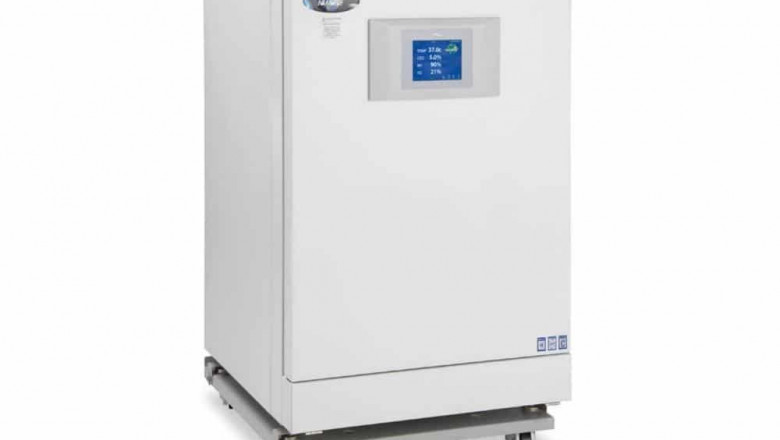views
The carbon dioxide (CO₂) incubator market is an essential sector in laboratory equipment, supporting crucial applications in cellular research, microbiology, and biotechnology. These incubators provide controlled environments for cultivating cell cultures, tissues, and bacteria, where precise temperature, humidity, and CO₂ levels are necessary for accurate growth. The market for CO₂ incubators has seen significant growth in recent years, driven by advancements in medical research, biotechnology, pharmaceuticals, and an increasing demand for personalized medicine.
Key Features of CO₂ Incubators
CO₂ incubators are designed to maintain an environment that mimics the natural conditions required for the optimal growth of living cells. They regulate the levels of carbon dioxide, temperature, and humidity to ensure that cells thrive in a consistent and controlled atmosphere. These incubators use CO₂ to maintain the pH levels of the culture medium, making them indispensable for applications in tissue culture and genetic research.
The most common configurations of CO₂ incubators include direct heat and water-jacketed systems. Direct heat incubators heat the chamber by using an electrical resistance element, while water-jacketed incubators use a water system to maintain even temperature distribution. Some models also feature advanced functions such as air filtration systems, automatic decontamination cycles, and advanced monitoring features to enhance the performance of the incubator.
Market Drivers
The rise in biopharmaceuticals, especially the development of vaccines and biologics, has fueled demand for CO₂ incubators. In the wake of global health crises, such as the COVID-19 pandemic, the importance of vaccine development and gene therapy has escalated. As pharmaceutical companies increasingly invest in research and development (R&D), the demand for CO₂ incubators grows, as they play a pivotal role in the cultivation of cell cultures required for these innovations.
Furthermore, the expansion of regenerative medicine, stem cell research, and cancer research is contributing to the market growth. The use of CO₂ incubators is crucial in these fields, as they enable researchers to cultivate healthy cells, create tissue engineering models, and test new treatment strategies. The ability to maintain precise environmental conditions in an incubator accelerates the pace of scientific discovery.
The growing emphasis on personalized medicine is also a key factor in expanding the market. CO₂ incubators help in the development of targeted therapies and genetic research, which are integral to personalized approaches to healthcare. As precision medicine becomes a larger part of clinical practice, the need for specialized cell culture environments continues to rise.
Technological Advancements
Technological advancements have been a significant driver for the growth of the CO₂ incubator market. Newer models are equipped with state-of-the-art features such as touchscreen interfaces, advanced sensors for real-time monitoring, and integrated alarms to alert users to any irregularities. These innovations improve usability, safety, and reliability, ensuring that sensitive experiments or cell cultures are not compromised.
In addition to real-time monitoring, advancements in connectivity and data management have allowed researchers to monitor CO₂ incubators remotely. With the integration of IoT (Internet of Things) technologies, researchers can track conditions in the incubator via mobile devices or computers. This connectivity enables more efficient management of incubator environments, reduces the risk of contamination, and streamlines lab operations.
The trend towards energy efficiency and sustainability is another notable development. Modern CO₂ incubators are designed with energy-saving features, including low-energy consumption systems, reduced CO₂ emissions, and more efficient temperature control mechanisms. This not only lowers operational costs but also aligns with the global push toward greener laboratory practices.
Market Challenges
Despite the robust demand for CO₂ incubators, there are several challenges within the market. One of the primary concerns is the high cost of advanced incubators, which can be a barrier for smaller laboratories, particularly those in developing regions. While the technology continues to advance, the upfront investment and maintenance costs can be prohibitive for some institutions.
Additionally, the complexity of maintaining CO₂ incubators can pose difficulties. Regular calibration, servicing, and ensuring optimal performance of features like humidity control and CO₂ sensors require technical expertise. This adds to the operational costs and creates a dependency on specialized personnel for upkeep.
Regional Insights
The CO₂ incubator market is expanding globally, with strong growth observed in North America, Europe, and Asia-Pacific. North America holds a dominant share of the market due to the presence of leading biotechnology and pharmaceutical companies, as well as significant R&D investments. The United States is a major contributor, with its strong healthcare infrastructure and well-established biotechnology sector.
Asia-Pacific is emerging as a lucrative market due to the growing number of research institutes, increasing government funding for scientific research, and expanding healthcare sectors. The demand for CO₂ incubators is rising rapidly in countries such as China, Japan, and India, where biotechnology and healthcare innovations are becoming key priorities.
Conclusion
The carbon dioxide incubator market is experiencing steady growth as the need for precise and reliable environments for cell culture and research intensifies. Technological advancements, coupled with the rise in personalized medicine and pharmaceutical research, are fueling the demand for more sophisticated incubators. However, challenges such as high costs and maintenance requirements remain. As innovation continues to drive the market, CO₂ incubators are set to play a pivotal role in advancing medical research and biotechnological innovations, shaping the future of healthcare and science.






















Comments
0 comment